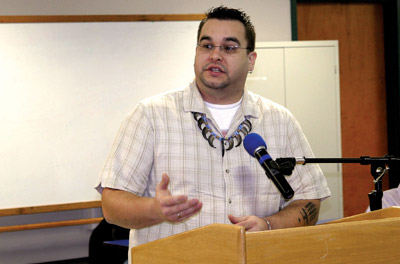Culture
Tribe receives funding for Tribal Historical Preservation Officer

Smoke Signals editor
Tribal member and Tribal Cultural Protection Coordinator Eirik Thorsgard is now wearing a new hat as Tribal Historic Preservation Officer.
Thanks to a more than $27,000 grant from the National Park Service, the Grand Ronde Tribe now has increased sovereignty in controlling its architectural and historic sites on Reservation and trust lands.
Previously, Thorsgard told the General Council meeting held at the Grand Ronde Tribal Community Center on Feb. 6, if the Tribe discovered a potentially historic site on its lands, it had to obtain a ruling from the State Historic Preservation Office before work could continue.
"We would have to wait for the state and that could take anywhere from 30 to 60 days," Thorsgard said.
Now, Thorsgard has the authority to assess potential archeological materials and devise plans to avoid affecting the site or move the materials out of the way of planned development.
Thorsgard said he has been working on obtaining this federal designation since June 2009.
As part of being the Tribe's new Historic Preservation Officer, Thorsgard is seeking Tribal members who would like to serve on an advisory board. Those interested can contact him at 503-879-1630 or eirik.thorsgard@grandronde.org.
Thorsgard said the Grand Ronde Tribe is now one of 103 federally recognized Tribes in the country with a Tribal Historic Preservation Office. There are 565 federally recognized Tribes.
Thorsgard added that the funding is never guaranteed, since it does come from the federal government, and the amount the Tribe receives may either be less than or more than the $27,000 expected this year.
In other action during the meeting, Tribal Council member Jack Giffen Jr. encouraged Tribal members to support an Oregon Department of Environmental Quality proposal to revise state water quality standards based on a fish consumption rate of 175 grams a day.
"We've been working on this for years," Giffen said, acknowledging Tribal Chairwoman Cheryle A. Kennedy's work on the effort as well. "This is a substantial increase."
The higher fish consumption rate will result in decreasing the levels of toxic pollution that are considered "allowable" in Oregon's rivers, lakes and streams.
The proposed 175 grams per day rate is based, in part, on a study of ceremonial and subsistence consumption habits of Native Americans who reside in, catch and consume fish within the Columbia River Basin. The study found that consumption of 23 eight-ounce servings of fish meals per month is a realistic value that represents consumption habits of Native peoples.
Letters of support will be forwarded to Andrea Matzke at the state Department of Environmental Quality's Water Quality Division, 811 S.W. Sixth Ave., Portland OR 97204.
Tribal Council member Chris Mercier also donated one of his paychecks - about $2,150 - to the Tribal Library.
"This is going to an area that I am confident that it will make a difference in the community," Mercier said about his donation given to Tribal member and Education Division Manager April Campbell. "The Tribal Library is going through an expansion and they should be able to buy a lot of books with this money."
Tribal Elders Nancy Coleman and Dorothy Shortt and Tribal spouse Duane Coulson won the $50 door prizes and Tribal Elder Qahira Lorraine Barton won the $100 door prize.
The next General Council meeting will be held 11 a.m. Sunday, March 6, in either Portland or Eugene.
